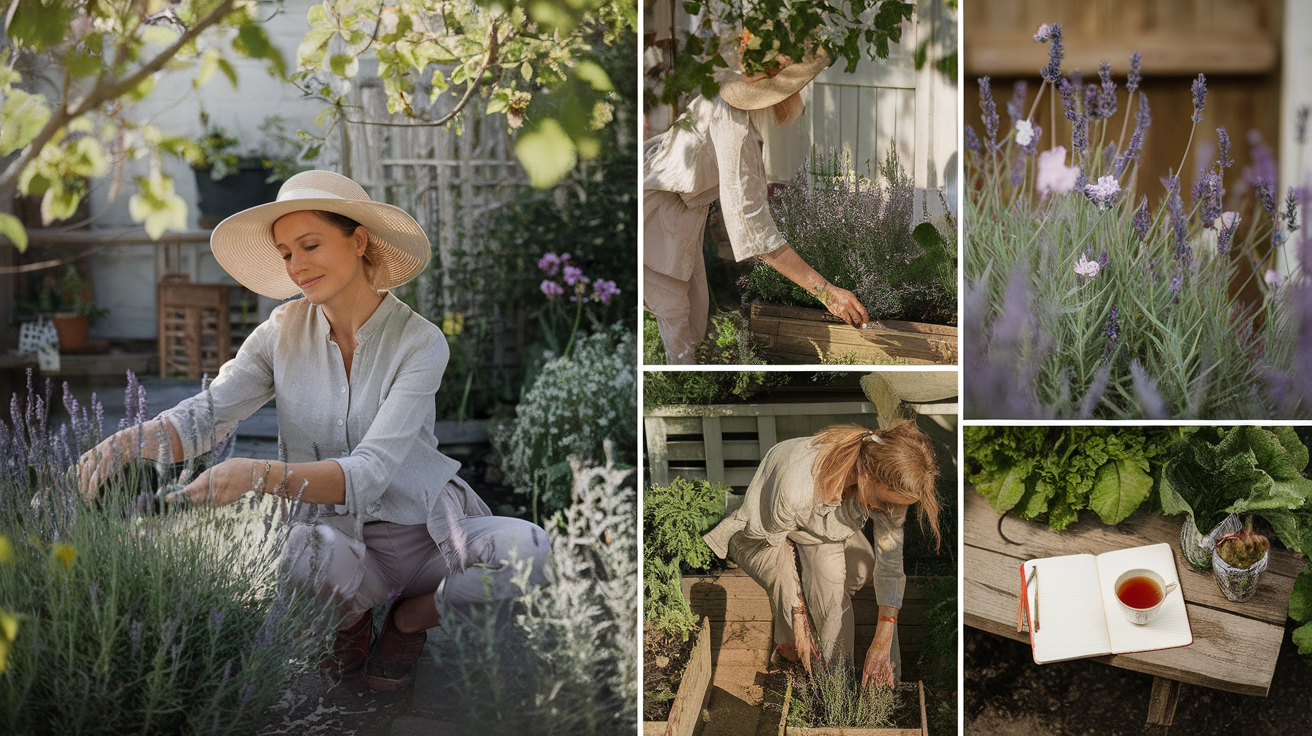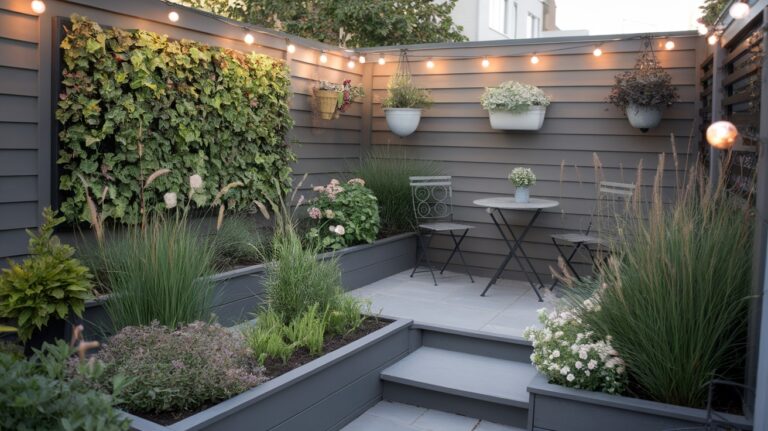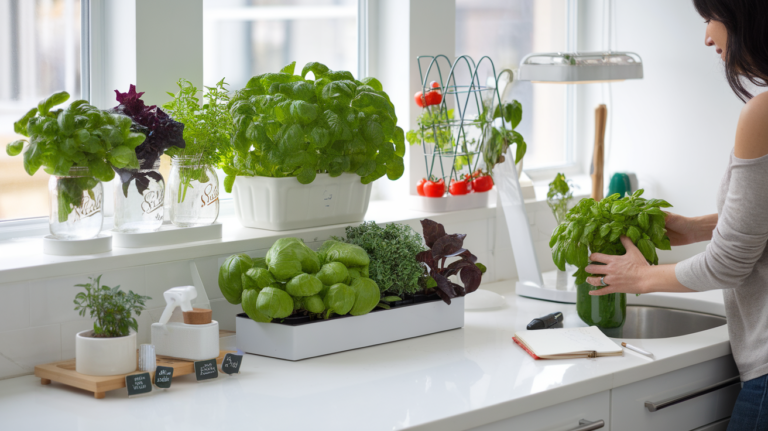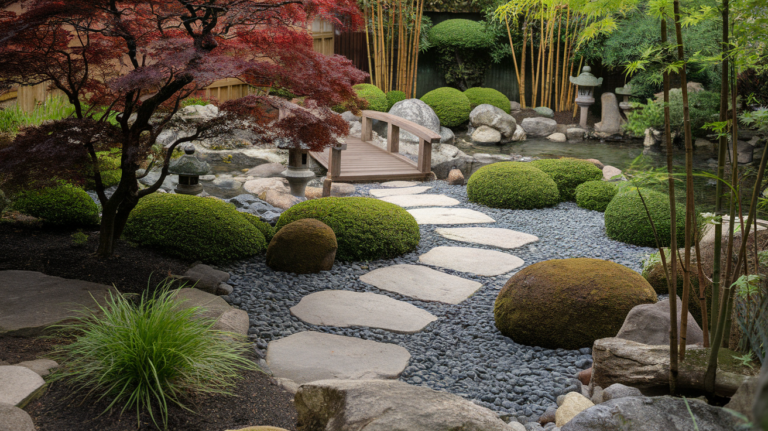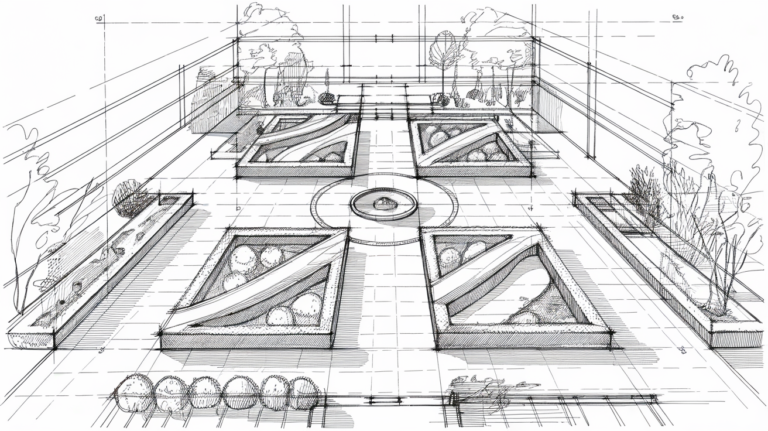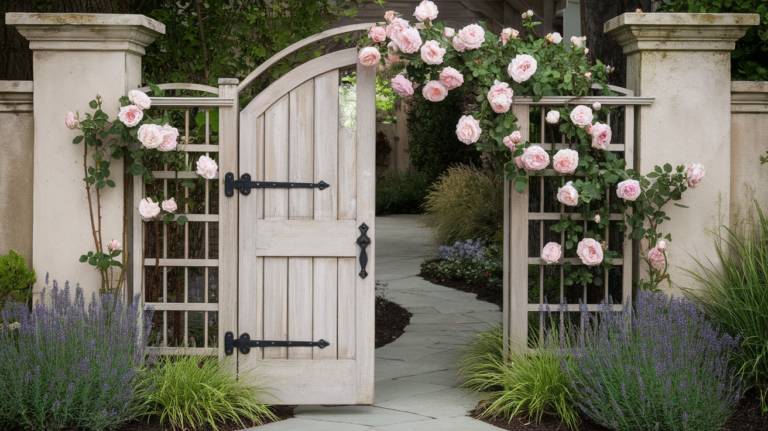25 Incredible Mental Health Benefits of Gardening You Need to Know
Gardening isn’t just about growing plants; it’s a simple yet powerful way to boost your mental health. Getting your hands in the soil and nurturing life can reduce stress, elevate mood, and even improve focus. Let’s dig into how cultivating your green thumb can lead to a happier, more balanced you!
Therapeutic Benefits of Soil Contact

In this image, hands gently nurture a young plant as it finds its place in rich, dark soil. This simple act of planting is a powerful reminder of how engaging with soil can positively impact our mental health and overall well-being.
Soil contact has therapeutic benefits that many people might not realize. Getting your hands dirty while gardening can bring a sense of calm and connection to nature. Activities like this are often part of horticulture therapy, which helps improve mental health through engaging with plants.
Having a sensory garden or a backyard gardening space allows individuals to experience the textures, smells, and sights of nature. These elements play a key role in enhancing mental health support, especially for those seeking recovery from stress or anxiety.
Engaging in gardening as a lifestyle hack can lead to physical well-being. Spending time outside not only provides light exercise but also promotes feelings of happiness and relaxation. Whether you’re potting plants or caring for a school garden, the benefits are abundant!
Community Connection through Shared Gardening

There’s something special about gathering in a garden. In this image, a diverse group of people joyfully engages in gardening together. They share smiles and laughter while tending to the plants, creating a warm and welcoming atmosphere.
Gardening is more than just planting seeds; it builds connections. These individuals are not just growing vegetables and flowers; they’re nurturing friendships and supporting each other’s mental health. Activities like these promote horticulture therapy, which is known for its benefits in improving mental health and wellbeing.
The shared effort in the garden encourages teamwork and communication. Whether it’s a school garden or a community plot, the act of gardening can provide mental health support, allowing everyone to feel included. This is especially true for those who may find solace in nature, benefiting from eco therapy and light exercise.
Gardening creates cozy spaces where people can relax and connect. As they pot plants and care for the greenery, they also cultivate a sense of belonging. This kind of community involvement can greatly enhance physical wellbeing and facilitate mental health recovery.
Stress Reduction through Nature Interaction

Nature has a unique way of calming the mind. In this image, we see a person sitting peacefully among vibrant flowers, surrounded by greenery. This scene perfectly captures the essence of stress reduction through nature interaction.
Gardening and spending time in beautiful spaces can greatly improve mental health. The colors of the flowers stimulate the senses, making the experience enjoyable and soothing. Engaging with a sensory garden can bring joy and promote relaxation.
Horticulture therapy highlights the benefits of gardening for mental health. Whether it’s potting plants or tending to a backyard garden, these activities can serve as effective lifestyle hacks for stress relief. They encourage light exercise and provide a sense of accomplishment.
Forest bathing is another excellent way to connect with nature. Just being outdoors can enhance physical wellbeing and support mental health recovery. This image beautifully illustrates how taking a moment to breathe and appreciate nature can lead to a more serene state of mind.
Mindfulness and Presence in Gardening

Gardening is more than just planting seeds and watering them. It offers a chance to connect deeply with nature. In this image, we see hands gently tending to the soil, showcasing the tactile experience of gardening. This interaction allows for mindfulness, helping us to focus on the present moment.
As we dig our hands into the earth, we become aware of our surroundings. The vibrant orange flowers and fresh green leaves remind us of the beauty in small moments. Engaging with plants can be a form of eco therapy, promoting mental health and wellbeing.
This practice is often linked to horticulture therapy, where the benefits extend beyond physical activity. Studies show that gardening can improve mental health, offering a holistic lifestyle approach. It’s a simple yet effective way to improve mental health, especially when creating cozy spaces in our backyards.
Whether you’re a beginner or have years of experience, gardening encourages a calm state of mind. It allows for light exercise and a retreat from everyday stress. So, the next time you find yourself in the garden, take a moment to truly soak in the surroundings and enjoy the simple act of planting.
Boosting Mood with Plant Care

Taking care of plants can bring a sense of joy and accomplishment. The image shows hands gently touching a vibrant green plant, basking in sunlight. This simple act of nurturing can lift your spirits and create a cozy atmosphere in your space.
Engaging with plants is a form of plant therapy. It connects you to nature and offers mental health support. The sunlight shining through highlights the beauty of the leaves, reminding us of the calming effects of gardening. A sensory garden, filled with various plants, can provide a therapeutic experience that enhances well-being.
For beginners, starting a small garden can offer multiple gardening benefits. Whether it’s enhancing your backyard or creating a cozy indoor space, each moment spent with plants fosters mindfulness and relaxation. You don’t need to have a green thumb to feel the mental health recovery benefits that come from being around greenery.
So, whether you’re potting plants or simply admiring their growth, remember that each nurturing act is a step towards improving your mental health and overall well-being.
Physical Activity and Mental Wellness

Gardening is a wonderful way to boost both your physical and mental health. In this image, we see someone digging in a vibrant flower bed, surrounded by a burst of colorful blooms. This scene perfectly captures the joy and serenity of engaging with nature.
Physical activity, like gardening, offers numerous benefits. It gets you moving and can improve your strength and flexibility. With each scoop of soil, you not only cultivate plants but also your own well-being. The act of working in a garden can help reduce stress and promote relaxation.
The concept of garden therapy highlights the mental health support that gardening can provide. Spending time outdoors, especially in a sensory garden filled with various colors and scents, can enhance your mood. It’s like a little escape from everyday worries.
Whether you’re a beginner or a seasoned gardener, there are many gardening benefits to explore. From improving mental health to creating cozy spaces in your backyard, gardening can be a fulfilling lifestyle hack. So grab a shovel and start digging your way to better health!
Creative Expression through Garden Design

This vibrant garden scene shows how creativity blooms through thoughtful design. The variety of succulents in different colors and shapes draws the eye and sparks joy. Each plant has its own personality, blending harmoniously to create a stunning visual feast.
Using elements like rocks and unique decorations, this space becomes a cozy area to relax and unwind. Gardens like these can bring numerous benefits. They serve as a sensory garden, encouraging connection to nature and promoting mental health.
Engaging in gardening is a form of light exercise that nourishes both the mind and body. It’s a place where you can practice eco therapy, enhancing your physical wellbeing while enjoying the beauty of nature. Whether you are a beginner or an experienced gardener, creating your own backyard sanctuary can be deeply rewarding.
Think about incorporating various plants to enhance your space. Succulents are not just pretty; they thrive with minimal care, making them perfect for busy lifestyles. Start small, and you’ll see how gardening can improve your mental health and transform your living area.
Breathing Fresh Air for Mental Clarity

Imagine standing in a lush garden, surrounded by vibrant green leaves and the gentle rustle of nature. This image captures a moment of pure tranquility, where someone embraces the fresh air, eyes closed, and head tilted back. It’s a simple act, yet it opens the door to mental clarity and relaxation.
Fresh air does wonders for our minds. It helps clear away the clutter and stress that often cloud our thoughts. When we breathe deeply in places like this, we tap into the benefits of gardening and green spaces that promote mental health and well-being. Activities like horticulture therapy or simply potting plants can enhance our mood and support mental health recovery.
Being in a garden also allows for light exercise, which can boost our overall physical well-being. Whether it’s strolling through a school garden or tending to your backyard, these cozy spaces provide a perfect backdrop for mindfulness. Engaging with nature can be a lifestyle hack for improving mental health, making it easier to find calm amidst the chaos.
So, next time you need a mental reset, consider stepping outside. The great outdoors offers a refreshing escape. Let nature work its magic on your mind!
Sense of Accomplishment from Harvesting

Harvesting your own vegetables brings a unique sense of joy. In this image, we see a beaming individual holding a basket filled with vibrant produce. This moment captures the essence of hard work paying off. The variety of vegetables signifies a successful garden, showcasing what dedication can achieve.
Gardening offers numerous benefits for mental health and well-being. It’s a practical way to engage in eco therapy, allowing individuals to connect with nature while nurturing their plants. As the person smiles with pride, it’s clear that this experience goes beyond just physical activity; it’s a boost for mental health recovery too.
For beginners, starting a garden might seem daunting. However, once you see the fruits of your labor, motivation flourishes. Even a small backyard can transform into a sensory garden filled with colors and smells that uplift your mood. The act of gardening itself can be a form of light exercise, offering both physical and emotional rewards.
Garden therapy not only improves mental health but also fosters a sense of community. Sharing your harvest with friends or family enhances connections and creates cozy spaces filled with laughter and love. So, grab that basket and start planting! The rewards are waiting.
Engaging the Senses with Flowers

Flowers have a unique way of capturing our attention and engaging our senses. The image showcases a beautiful arrangement of colorful daisies, featuring vibrant pinks, yellows, and blues. This visual feast invites us to appreciate the beauty around us.
The close-up of a woman’s face, framed by these flowers, highlights the connection between nature and our own well-being. This kind of imagery can evoke feelings of joy and tranquility, reminding us of the mental health benefits of gardening. Spending time among flowers can improve mental health and support recovery.
Creating a sensory garden or a cozy backyard space filled with plants can be a form of eco therapy. Engaging with flowers not only brings beauty into our lives, but it can also serve as a powerful form of plant therapy. Such activities promote physical wellbeing and contribute to a holistic lifestyle.
Whether you’re potting plants or simply enjoying a stroll through a garden, the benefits of gardening are clear. Flowers like these can inspire us to take a moment to breathe deeply and appreciate the colors and scents surrounding us. So next time you see flowers, take a moment to engage your senses!
Routine and Structure from Gardening

This image perfectly captures the essence of finding routine and structure through gardening. The person in the photo is deep in thought, studying a plan or guide while surrounded by vibrant plants. This scene illustrates how a thoughtful approach to gardening can enhance mental health and well-being.
Gardening encourages a steady rhythm to life. Each season brings different tasks, from planting seeds to harvesting. This structured routine can significantly improve mental health by providing a sense of purpose and accomplishment. With each plant that grows, there’s a tangible reminder of effort and care.
The benefits of gardening extend beyond just physical activity. Engaging with nature can be a form of eco-therapy, helping to reduce stress and promote relaxation. As this individual reviews their gardening plan, they embody the therapeutic aspects of horticulture, showcasing how even a simple garden can support mental health recovery and enhance physical well-being.
For beginners, starting a school garden or a cozy backyard garden can be a great option. These projects not only foster community but also serve as a wonderful way to learn about the benefits of gardening. Each plant nurtured can lead to improved mental health and thoughtful reflection.
In summary, incorporating gardening into daily life offers a fulfilling routine that can lead to numerous mental health benefits. Whether you’re potting plants or enjoying the serene beauty of a sensory garden, the structure of gardening can provide a comforting escape while nurturing your well-being.
Connection to the Seasons and Nature’s Cycles

This vibrant garden image beautifully showcases the connection between nature and the changing seasons. Each flower and leaf tells a story of growth, renewal, and the passage of time.
The lush greenery and blooming flowers remind us of the benefits of gardening. Engaging with plants can improve mental health and wellbeing. It’s a joyful activity that encourages us to be present and mindful.
In this garden, a variety of colors symbolize different seasons. Purple blooms and sunny yellows create a cheerful atmosphere, perfect for a sensory garden. Such spaces can serve as a sanctuary for those seeking mental health support.
By tending to a school garden or a backyard, individuals can experience the therapeutic aspects of horticulture. Whether it’s potting plants or simply enjoying the fresh air, gardening promotes a holistic lifestyle.
As we observe the seasonal shifts, we can also find peace in small moments of light exercise, like weeding or watering. This garden not only nourishes plants but also nurtures our physical wellbeing.
Embracing the cycles of nature can lead to significant mental health recovery. Imagine the calming effects of forest bathing or simply sitting in a cozy space surrounded by flowers. These experiences remind us of the beauty of nature and our connection to it.
Coping with Anxiety through Gardening

Gardening can be a lovely way to manage anxiety. In the image, we see a woman happily tending to her plants. This cheerful activity shows how gardening connects us with nature, allowing us to focus on the present moment.
The vibrant greens and colorful flowers in her garden create a calming atmosphere. This setting is ideal for practicing mindfulness, which can be very beneficial for mental health and wellbeing. Engaging with plants helps improve mental health and can even serve as a form of therapy.
Whether you’re planting flowers or creating a cozy vegetable patch, the act of digging in the soil and nurturing plants can promote a sense of accomplishment. Gardening is a wonderful lifestyle hack that encourages light exercise, providing both physical and mental health benefits.
It’s like creating your own sensory garden, where every color and scent can uplift your mood. So, if you’re feeling overwhelmed, consider spending time in your garden. It might just be the perfect way to cope with anxiety and embrace a healthier lifestyle.
Intergenerational Bonding in Garden Activities

In this heartwarming scene, a grandmother and her young grandson are enjoying a sunny day in the garden. They are working together to plant small green shoots in the soil. The boy, in a bright yellow shirt, looks curious and engaged, while the grandmother smiles warmly as she guides him.
Gardening is a wonderful way to bring different generations together. It offers a chance to share knowledge, stories, and laughter. As they dig in the dirt and talk about the plants, they build a strong bond that lasts a lifetime.
Gardening activities like this can also provide mental health support. The physical act of planting and caring for plants can improve mental health and wellbeing. It’s a light exercise that encourages relaxation and connection with nature.
For beginners, getting started in the garden is simple. Just a few pots, some soil, and seeds can make a cozy space to enjoy. Plus, the benefits of gardening extend beyond just having fun. Engaging in these activities can be a form of eco therapy, helping to improve overall physical and mental wellbeing.
Next time you’re in the garden, think about inviting a loved one to join. It’s a perfect opportunity for quality time, learning about horticulture therapy benefits, and enjoying the fresh air together.
Fostering Patience and Resilience with Plant Growth

In this inspiring image, a tiny seedling emerges from the rich brown soil. Its delicate leaves are just starting to unfurl, symbolizing new beginnings and the beauty of growth. This scene captures the essence of patience, as the seed must wait for the right conditions to sprout. It’s a gentle reminder that great things take time.
This process of plant growth mirrors our own journeys. Just like this seedling, we often face challenges that require us to nurture our mental health and well-being. Engaging in activities like gardening can significantly boost our mental health support. Horticulture therapy and plant therapy offer wonderful benefits, helping to build resilience and improve overall well-being.
Creating a school garden or a cozy backyard space can provide not just a sense of accomplishment, but also a calming environment. These gardening benefits extend beyond just physical activity; they promote emotional healing and mental clarity. So why not consider planting your own little garden? It’s a lifestyle hack that can transform your space and your mind!
Gardening as a Form of Meditation

Imagine sitting peacefully in a field of vibrant flowers, surrounded by nature’s beauty. In this serene setting, a person meditates, finding calm among the blossoms. This scene perfectly illustrates how gardening and meditation go hand in hand.
Gardening offers a unique way to connect with the earth. The act of planting and nurturing plants can be incredibly therapeutic. Sensory gardens, for instance, are designed to engage all five senses, providing a soothing experience that promotes mental health and wellbeing.
Studies show that gardening can enhance mental health, acting as a form of exercise and a way to relieve stress. Whether you’re tending to a school garden or your own backyard, the act itself can improve mood and support mental health recovery.
As you cultivate your garden, you also cultivate a sense of peace. Each flower, each leaf, contributes to a cozy space where you can unwind. Incorporating potting plants into your routine or simply enjoying the view can turn your gardening time into a holistic lifestyle choice.
So, whether you’re a beginner or a seasoned gardener, consider how this practice can serve as a gentle reminder to slow down and appreciate the beauty around you. Embrace the benefits of gardening, and let it lead you to a more mindful way of living.
Art Therapy through Floral Arranging

Floral arranging is not just about creating beautiful bouquets; it’s a wonderful form of art therapy. This image of vibrant flowers showcases the joy and creativity involved in putting together a stunning arrangement. The hands holding the bouquet symbolize the care and attention that goes into each piece, making it a perfect representation of mental health support through horticulture.
Engaging in floral arranging can significantly improve mental health. The act of selecting colors and textures helps to promote mindfulness, allowing individuals to focus on the present moment. This sensory activity is a great way to experience the benefits of a sensory garden at home.
Gardening, including floral arrangements, offers various therapy benefits. It encourages physical activity while allowing for self-expression. Being surrounded by nature has been shown to enhance feelings of well-being and reduce stress. Plus, nurturing plants leads to a sense of accomplishment, which is vital in mental health recovery.
Incorporating art and nature together, like in this floral display, can create cozy spaces that promote relaxation. Whether you’re just starting or you’ve been arranging flowers for years, there’s plenty to explore in the world of gardening. This is an incredible way to connect with yourself and your environment.
Developing Responsibility and Care through Gardening

Gardening is a beautiful way to teach responsibility and care, especially with younger generations. In the image, we see a little one immersed in the joy of gardening. The child is focused intently on a plant, showcasing curiosity and a sense of duty. Holding a watering can, they’re ready to nurture the growth of their little green friends.
This scene is a perfect example of how gardening can foster important life skills. As children engage in planting and caring for flowers or vegetables, they learn the value of patience and dedication. Each small action, from watering to weeding, reinforces a sense of responsibility.
Gardening also offers various mental health benefits. It’s known to improve mental health by providing a calming activity that connects individuals with nature. This kind of eco therapy is especially beneficial for kids, helping them to manage stress and enhance their overall well-being.
Creating cozy spaces like a school garden or a backyard garden can be a great way to get children involved. These environments encourage exploration and creativity. Gardening instills a sense of accomplishment as little ones watch their efforts bloom into life.
Overall, gardening is not just about plants; it’s about growing responsible individuals. The lessons learned in the garden can last a lifetime, making it a wonderful activity for families to bond over.
Mindful Eating from Home-Grown Produce

Imagine stepping into your kitchen and being greeted by a vibrant array of fresh vegetables. This image captures that delightful moment. Bright red tomatoes, crisp green vegetables, and earthy carrots create a colorful display. Each vegetable represents the joy of home gardening and the benefits it brings to our well-being.
Growing your own produce connects you to nature. It’s a simple yet powerful way to boost mental health and enhance your lifestyle. Engaging in gardening, even if just in a small backyard, has incredible benefits. It’s a form of eco therapy that not only nurtures your body but also feeds your mind.
Mindful eating becomes easier when you have fresh, home-grown ingredients at your fingertips. You can whip up delicious meals that are healthy and satisfying. Plus, prepping meals with your own produce adds a personal touch that store-bought options can’t match. Think of how much more rewarding it feels to enjoy a salad made from your own tomatoes and greens.
This approach to eating encourages you to appreciate the flavors and textures of fresh vegetables. It’s all about savoring each bite and recognizing the effort that went into growing your food. Gardening can be a form of plant therapy, promoting a sense of fulfillment and mental health support.
As you consider starting your own garden, remember that even small spaces can yield a bountiful harvest. Whether it’s a small pot on a balcony or a few beds in a backyard, every bit counts. The journey of growing your own food is a lifestyle hack that can improve your overall well-being and introduce light exercise into your day.
Nature’s Beauty and its Impact on Mental Health

Being surrounded by nature can boost our mood and reduce stress. Gardens like this one are perfect for practicing horticulture therapy. It’s a great way to connect with plants and enjoy the benefits of gardening.
Gardening can act as a form of eco therapy, which supports mental health recovery. Engaging with the earth through light exercise and caring for plants helps improve mental well-being. It’s a simple lifestyle hack that anyone can adopt.
Incorporating sensory gardens into our lives can also enhance our mental health. These spaces stimulate our senses and offer a therapeutic escape from everyday life. So whether you have a backyard or a small balcony, consider getting into gardening. The benefits are vast!
Gardening for Seniors: A Path to Enhanced Well-being

Gardening is not just a hobby; it is a powerful form of therapy. The act of planting and nurturing flowers and plants connects individuals with nature, offering numerous horticulture therapy benefits. Activities like watering plants and arranging flowers provide light exercise, which can enhance physical well-being.
Creating a cozy and inviting garden space also helps cultivate a sensory garden. The colors, scents, and textures stimulate the senses, promoting relaxation and mindfulness. For seniors, this outdoor experience can be a great way to find enjoyment and combat feelings of isolation.
Whether it’s a backyard garden or a simple potting project, the benefits of gardening are clear. It’s an ideal lifestyle hack to improve mental health and support physical activity. Embracing this holistic lifestyle can lead to a fulfilling routine that enhances overall quality of life.
Enhancing Focus and Concentration while Gardening

The greenery surrounding our gardener is a reminder of the benefits of being outdoors. Nature plays a significant role in mental health support. Engaging in activities like this can boost mental health and wellbeing.
For beginners, gardening can also serve as a fantastic introduction to a holistic lifestyle. It combines light exercise with the therapeutic benefits of plant therapy, making it both enjoyable and beneficial. Whether you’re in a backyard or a community garden, you can reap the rewards of improving your physical and emotional health.
Creating cozy spaces in your garden can further enhance this experience. Inviting certain plants into your space not only beautifies but also promotes a sense of tranquility. This kind of sensory garden can serve as a retreat from the hustle of daily life.
Escaping Urban Life with a Backyard Garden

Imagine stepping into your own backyard garden, a peaceful retreat from the city chaos. This lovely space features a simple patio set surrounded by lush greenery. The fresh plants and soft grass invite you to relax and enjoy the outdoors.
Backyard gardening offers more than just a pretty view. It provides numerous benefits for mental health and wellbeing. Spending time in nature can help improve mood and reduce stress. Engaging in gardening activities can also boost physical wellbeing, making it a great form of light exercise.
The design of this garden captures the essence of horticulture therapy. It blends sensory elements with a cozy atmosphere, perfect for unwinding. Plant therapy encourages mindfulness, providing a calming effect, which is essential for mental health recovery.
Whether you have a big yard or a small corner, creating a green space can transform your lifestyle. Simple gardening hacks can make your backyard a haven for relaxation. Adding a few pots or a small flower bed can bring life to any area.
This garden inspires us to embrace the benefits of gardening. From improving mental health to creating cozy spaces, it’s a gentle reminder of how nature can enhance our daily lives. So grab your gardening tools and start your journey toward a serene outdoor oasis!
Learning and Growth through Gardening Education

This image captures a lively scene in a greenhouse where a group of people is engaged in gardening activities. They appear to be learning about plants and how to care for them. The setting is full of various potted plants, showcasing the diverse world of horticulture.
Gardening education offers numerous benefits. It connects people with nature and provides hands-on experience that enhances mental health and well-being. Participating in gardening can be a form of eco therapy, promoting physical well-being through light exercise and fresh air.
In this cozy space, individuals are likely discovering the therapeutic aspects of gardening. From plant therapy to school gardens, this educational approach supports mental health recovery and improves overall well-being. The act of nurturing plants can lead to feelings of accomplishment and calm, making it a perfect lifestyle hack for busy lives.
Engaging with nature, as shown in the image, fosters community and teamwork. It encourages sharing knowledge about gardening, which can be both fun and rewarding. Whether you are a beginner or have some experience, the benefits of gardening are clear. It’s not just about growing plants; it’s about growing as individuals.
Gardening for Children: Learning Life Skills

This image captures a delightful scene of young children getting their hands dirty in a garden. They are using colorful tools to dig into the soil, showing enthusiasm and curiosity. Gardening not only engages kids but also teaches them valuable life skills.
Through this hands-on experience, children learn about responsibility and caring for plants. They understand that taking care of something requires time and effort. This process is part of what makes gardening such a fantastic activity for kids.
Gardening can also boost mental health and wellbeing. It provides a sensory experience that helps children connect with nature. The feel of the soil, the colors of the plants, and even the sounds of a garden all contribute to a healthy lifestyle.
Moreover, working in a school garden or a backyard space encourages teamwork. Children collaborate and share tasks, strengthening their social skills. These interactions are just as important as the gardening itself.
In addition, the physical activity involved in gardening can improve overall health. Light exercise, like digging and planting, gets kids moving and promotes physical wellbeing. It’s a fun way to stay active!

